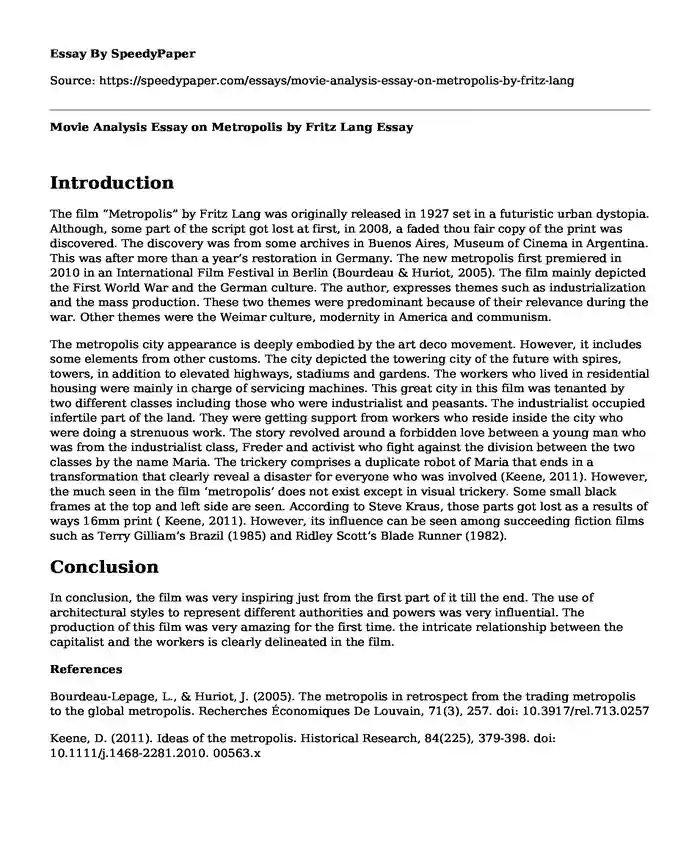
| Type of paper: | Movie review |
| Categories: | Movie |
| Pages: | 2 |
| Wordcount: | 446 words |
Introduction
The film “Metropolis” by Fritz Lang was originally released in 1927 set in a futuristic urban dystopia. Although, some part of the script got lost at first, in 2008, a faded thou fair copy of the print was discovered. The discovery was from some archives in Buenos Aires, Museum of Cinema in Argentina. This was after more than a year’s restoration in Germany. The new metropolis first premiered in 2010 in an International Film Festival in Berlin (Bourdeau & Huriot, 2005). The film mainly depicted the First World War and the German culture. The author, expresses themes such as industrialization and the mass production. These two themes were predominant because of their relevance during the war. Other themes were the Weimar culture, modernity in America and communism.
The metropolis city appearance is deeply embodied by the art deco movement. However, it includes some elements from other customs. The city depicted the towering city of the future with spires, towers, in addition to elevated highways, stadiums and gardens. The workers who lived in residential housing were mainly in charge of servicing machines. This great city in this film was tenanted by two different classes including those who were industrialist and peasants. The industrialist occupied infertile part of the land. They were getting support from workers who reside inside the city who were doing a strenuous work. The story revolved around a forbidden love between a young man who was from the industrialist class, Freder and activist who fight against the division between the two classes by the name Maria. The trickery comprises a duplicate robot of Maria that ends in a transformation that clearly reveal a disaster for everyone who was involved (Keene, 2011). However, the much seen in the film ‘metropolis’ does not exist except in visual trickery. Some small black frames at the top and left side are seen. According to Steve Kraus, those parts got lost as a results of ways 16mm print ( Keene, 2011). However, its influence can be seen among succeeding fiction films such as Terry Gilliam’s Brazil (1985) and Ridley Scott’s Blade Runner (1982).
Conclusion
In conclusion, the film was very inspiring just from the first part of it till the end. The use of architectural styles to represent different authorities and powers was very influential. The production of this film was very amazing for the first time. the intricate relationship between the capitalist and the workers is clearly delineated in the film.
References
Bourdeau-Lepage, L., & Huriot, J. (2005). The metropolis in retrospect from the trading metropolis to the global metropolis. Recherches Économiques De Louvain, 71(3), 257. doi: 10.3917/rel.713.0257
Keene, D. (2011). Ideas of the metropolis. Historical Research, 84(225), 379-398. doi: 10.1111/j.1468-2281.2010. 00563.x
Cite this page
Movie Analysis Essay on Metropolis by Fritz Lang. (2023, Aug 16). Retrieved from https://speedypaper.net/essays/movie-analysis-essay-on-metropolis-by-fritz-lang
Request Removal
If you are the original author of this essay and no longer wish to have it published on the SpeedyPaper website, please click below to request its removal:
- The Underground Railroad Movie - Free Essay Sample
- Essay Example: Peter Pan Movie Review
- Essay Sample on Value of In-Person Conversations
- Essay Sample on Learning Games Increased Students' Interest to Learn Vocabulary
- Free Essay. Distant Suffering' of Others Produce a Sense of Compassion
- Free Essay. Forensic Anthropology- Season 11 Episode 5: Bones: Resurrection in Remains
- Paper Example on Gender Representation in Films: A Closer Look
Popular categories




